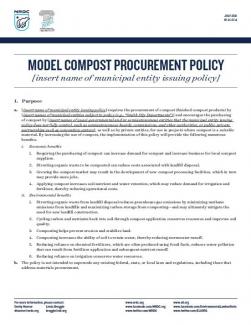
Composting is part of a holistic approach to reducing municipal food waste that also includes food waste prevention and rescue of surplus food. By turning food scraps into a natural soil amendment that can be used in city gardens and landscaping and improve soil health and water retention without the use of artificial fertilizers, composting provides myriad benefits, including reducing greenhouse gas emissions by diverting organic materials away from landfills where they emit methane.
This model policy created by Natural Resources Defense Council and the Environmental Law Institute can be used by municipalities to encourage or require the use of compost products. The policy is easily adaptable for individual municipalities.
A model policy with commentaries may be found at: https://www.eli.org/research-report/model-compost-procurement-policy-commentaries. Commentary is provided explaining the benefits of key provisions and alternative approaches, as well as links to examples—all of which are intended to help guide stakeholders and policymakers in tailoring the policy to the unique circumstances of their region. Special thanks to former ELI Public Interest Law Fellow Stephanie Oehler for research support and drafting.
This policy and other resources on food waste reduction are available through ELI’s Food Waste Initiative: https://www.eli.org/food-waste-initiative/food-waste-prevention-recovery-and-recycling.